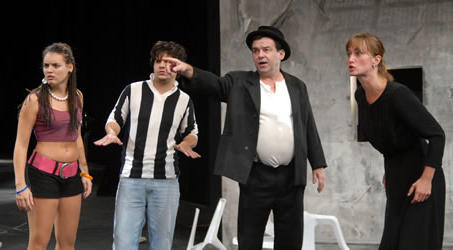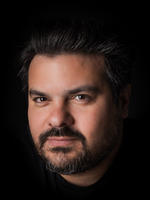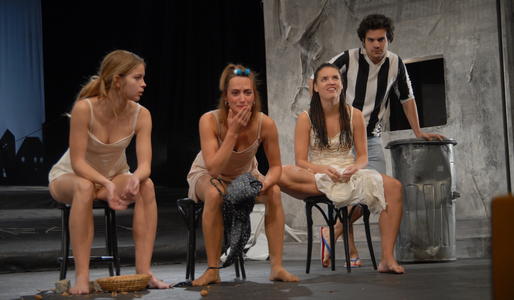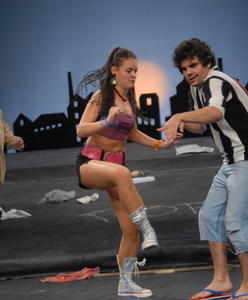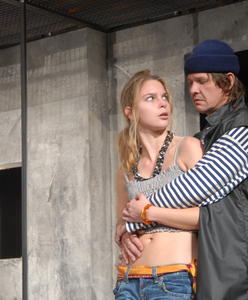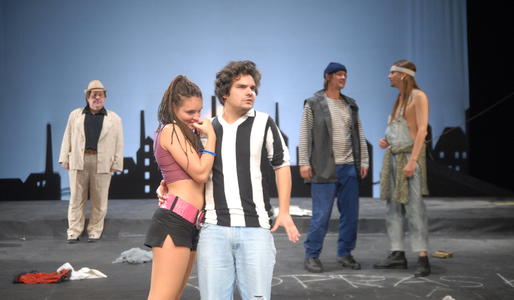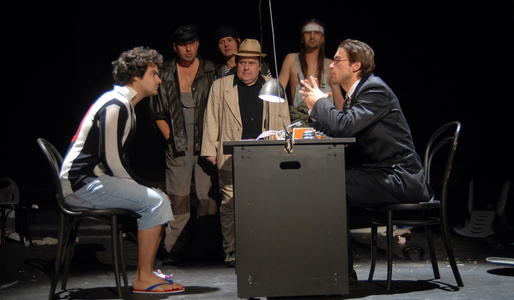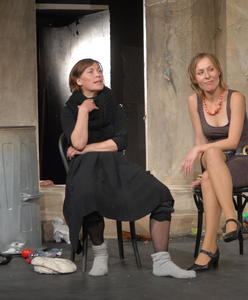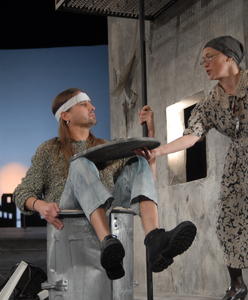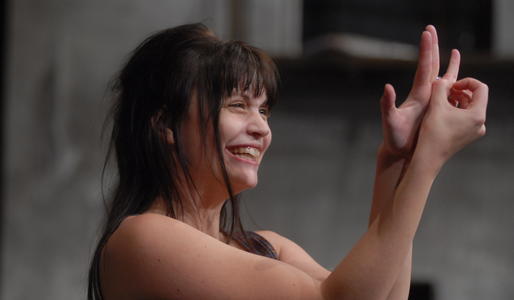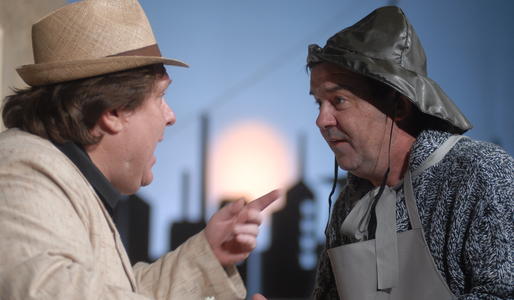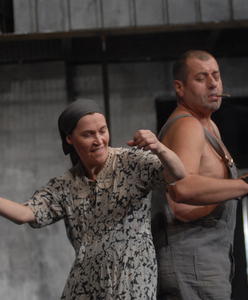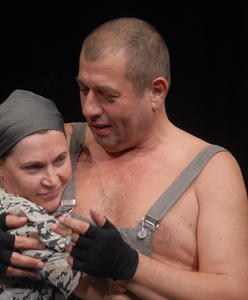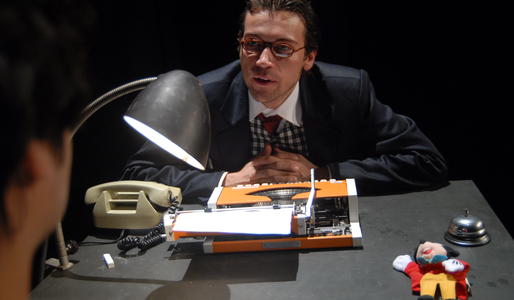Brisk Squabbles – Short and Entertaining
Petr Christov 27. December 2006 zdroj Divadelní noviny
Although the Brno City Theatre has been recently trying to be topical and modern in its dramaturgy, sometimes surprisingly, its repertoire will always include proven classical titles, mainly of comic character, such as Goldoni’s play The Squabbles of Chioggia. It was directed by Zdeněk Černín, in the translation by Jaroslav Pokorný, at the dramatic scene of the Brno City Theatre.
The Squabbles of Chioggia is a play which should not surprise the spectator very much. Quarreling women, family problems of two neighbours and several young pairs bedazzled and blinded with love. The stage designed by Jan Dušek also observes routine conventions. Two houses on both sides of the stage, an elevated space at the back evoking a channel shore where a boat appears. The background with sketched silhouettes of houses and a shining disc of the (rising?) sun completes well the impression of the periphery of a nearby town. And a small television in the front, as if replacing an altar or a chapel. We should be somewhere in a small Italian town (of course, in Chiozza according to Goldoni), but the good and brisk music by David Rotter takes you rather farther to the east, to slightly Arabian or Balkan dancing rhythms – however, do not rack your brain with it. It is substantial that the producers tried to lighten the text, made cuts and the resulting form is very likeable. The cuts in the first part are less expressive as the ladies’ entreé needs some time for moving off, but the scenes at the court in the second part are cut radically. The result is a brisk, almost a hundred-minute performance without any interval, amusing mainly with the excellent actors’ performances.
The Brno City Theatre dramatic ensemble is very rejuvenated in this production and its modification did also good to merited actors, such as Erik Pardus playing the role of wrongly articulating patron Fortunato who will make you laugh.
Jana Glocová in the role of donna Libera should be also noted. All of them seem to play with pleasure, giving their all. The director leads the actors to simple, but precious character types, differentiated markedly and able to give a point to situations and gags.
Individual situations come from the Goldoni’s text and are further developed with references to our present time. That is why, Toffolo, an owner of a boat-house (Alan Novotný), can walk on the stage dressed in a football dress with the legendary number ten on his back, that is why judge Isidoro (Lukáš Hejlík) can behave like a young, unexperienced lawyer and can get down with his desk on the rope from above like a god to intervene in the fates of quarrelling families. The similar functional element is a yellow television with its screen turned to the stage where all the present watch affectionately a telenovel. At the very conclusion, dabbing titles are used as an umbrella gag of the whole performance. Individual comic scenes do not usually try to be expressively original (except of the mentioned arrival of the judge), but anyway, they are imaginative and vital.
In spite of good actors’ performances, it may be sometimes difficult to understand particular situations and relations among figures; it is firstly due to the mentioned text adjustments. The good impression of the graphic stage design is somewhat disturbed with a too “modern” design of women’s costumes. In spite of that, the
Černín’s performance can be perceived like a successful comic work which can entertain without being ashamed of the level of its humour and its performance.
The Titles That Entertain Well
Peter Stoličný 11. December 2006 zdroj www.divadlo.sk
Two Premieres at the Brno City Theatre
The economic situation of the repertoire theatre, subsidized only partially by the city, is not easy. The theatre can take the way of increasing the number of repeats of individual productions, which would make the operation cheaper, but simultaneously, it could involve the risk that the seats would not be always sold out. However, the theatre can take a more courageous way and prepare new and new productions, thus ensuring a sold-out auditorium (of course, if the productions are good), and fight constantly with the budget. It is interesting that the Brno City Theatre has chosen the latter way, although they did not lack spectators in the previous years. I do not remember that the ticket SOLD OUT would be missing at any title on the poster in front of the ticket office. So why do they produce one performance behind another when they are putting on forty titles at two stages? It is really a shocking number. The reason can be only one – they enjoy it! They like doing a good theatre.
At the end of October we witnessed two premieres. Goldoni was put on the dramatic scene and the first Lloyd Webber's musical was played at the music scene. Both the performances were merry, had a rich and varicoloured stage design, both could be called: "Kassa Stück". But let's take it in an ordered way.
The Squabbles of Chioggia
Carlo Goldoni (1707–1793) has always been an appreciative author for the theatre. This hothead and innovator of Italian drama was born 33 years after Molière's death. He was a contemporary of Voltaire and Rousseau, romanticist Carlo Gozzi and encyclopedist Diderot. In that time, Carl Schlee discovered oxygen, James Watt invented a steam engine and Montgolfiery flied up in a balloon. The Spanish fought with the British, the Russians with Turkey, small wars resulted in the Seven-Year War, Bastilla in Paris was captured and Napoleon occupied a part of Italy. And in that political and military excitement of the eighteenth century, the dramatist Goldoni, who was a lawyer originally, reformed the folk Commedia dell’Arte and got the Italian comedy from the street to baroque stages of town buildings and palaces. His disciplined plays, in which improvisation was replaced with varied dialogues observed in a real life, were first accepted cagily. In fact, the great spectatorial success alternated with misunderstanding throughout the author's life. The comedy Le baruffe Chiozzote (the original title of The Squabbles of Chioggia) was received in the same way. The theme is based on common quarrels which have their origins in small-mindedness (somebody buys roasted pumpkins to somebody else, which causes jealousy) and can bring the families of simple fishermen into big disputes. Proportionally to the small-mindedness of quarrels their comic character is growing. Goldoni has always been topical, you will like laughing at the foolishness of others with him as you witness such nookies every day. The director Zdeněk Černín does not conceal his original profession of actor. The Brno's Squabbles is an excellent drama full of Italian hotheadedness and the dramatic bravura. A swift pace, battles on the stage worked out in a clownish way, seemingly spontaneous but precisely weighed out responses to witty dialogues. These all create the beautiful one hundred and ten minutes without an interval at which the repeated attacks to the spectators' funny-bones almost exhaust their unprepared bodies. After all, you do not meet a constant laughter much often at the present nervous world. But you do on the stage of the Brno City Theatre. You witness the dramatic performances on the varicoloured stage and in the costumes by Jan Dušek, with the crazy music by David Rotter, which have one expressive feature: the actors play their parts brilliantly, enjoy them and show it. It is hard to say which of them is the best. Patron Zdeněk Junák, Beppo played by Martin Havelka or fisherman Fortunato by Erik Pardus? The latter created perfectly unintelligible replies and garbles by leaving out vowels.
Entertainment, nothing else but entertainment. This performance could be called like this in summary. Perhaps, it should be added: a very good entertainment...
Joseph and The Amazing Technicolor Dreamcoat
The original title is: Joseph and the Amazing Technicolor Dremcoat. 'technicolor' is a metaphor indicating the pomposity, the superficiality and the kitschy character of the American entertainment industry. Fortunately, the director Moša has grasped Joseph at the Brno Music Scene exactly just like this. As a magnificent, beautiful kitsch. With everything what it includes. The technicolor colours, the lights, the background on which the children choir is projected, the animations of the dessert, the flowers, the palms, etc. The expressive acting and the clearly sung arias and choirs and the musical dancing art can be envied for a long time to the protagonists of the Brno City Theatre. The libretto by Webber's permanent co-worker Tim Rice was translated by Michael Prostějovský who kept consistently to the original. I mention it because the dramaturgy (the Brno one was led by experienced Pavlína Hoggard) usually makes smaller or bigger adaptations of originals. Anyway, Rice's texts are not genial. The author builds the story as a folding picture-book, he is not interested in the real history very much (Che Guevara in the musical Evita was a culmination of the distortion of history), he creates senseless acts of wilfulness and non-dramatic insertions. Perhaps, he would never get on the pedestal of the music and dramatic fame without brilliant Webber. The music numbers of their first, originally student musical bear all signs of undisciplined, mischief-making approach. From Benjamin Calypso to Pharaoh's rock and roll - it is a bold and youthful conglomeration.
Well, what makes the musical so successful? Definitely the music, the vocal and dancing demands that can only be met by the prepared. The Brno's orchestra was conducted by Karel Cón and Igor Rusinko (I saw him) and I must say that in spite of rather a small number of instruments it was a bold interpretation. The Brno singers are extraordinary good dancers and the dancers sing, in short, they are complete musical personalities. At the performance I saw Stano Slovák (from the Slovak Slovák family of actors) who was shining above the others in the role of Pharaoh. By adding the comic manners of a rock star to his flawless singing he came in for a long applause of the audience. His partner Markétka Sedláčková playing the part of diseuse fascinated the audience with her clear voice, but I could continue and enumerate all the performers.
Well, what makes the Brno's performance of Joseph so good? The execution. From the stage design by Ondřej Zich and costumes by Andrea Kučerová, through Černák's and Záhor's film animations, up to the inventive choreography by Igor Barberič. From Stanislav Moša's direction up to the dramatic, vocal and motional performances of all.
A beautiful musical kitsch succeeded. The real Technicolor. But it was meant like this originally. And kitsch is not a swear. When the orange sun declines above the Egyptian pyramids and the leaves of bent palms shine gold, it is a kitsch too. But a beautiful one. The musical at the Brno City Theatre is the same. And it is good.
The Magazine, Korean, the Seducer and Jesus from Brno
Luboš Mareček 1. November 2006 zdroj MF Dnes
The dramatic Brno was nicely variegated as regards its offer in the autumn. Which is good, but a nit-picker looks for various values in this glossary.
The audience can be got round with the comedy The Squabbles of Chioggia, ground off by ages, chosen by the Brno City Theatre. Fortunately, the Goldoni's evergreen did not become an obligatory funny item of the repertoire in the direction by Zdeněk Černín. Černín let bang the world of contentious Italians from a fisherman’s backcountry against the sterile world of current telenovels. Goldoni was a clear winner – not only in this optics.
The musical The Gypsies Go to Heaven is a novelty under the same theatrical mark. The former iconic film of socialist cinemas will offer an impressive vocal, music and dancing show at the Music Scene of the Brno City Theatre. The orchestra and the choir pulse in hymnic tones, the live cymbal band on the stage and the texts sung in Romany are pungent with animality. The performance really works. Perhaps just the grandiose and snobbish gemmy gate on the horizon opposes to the simple and free life of the Gypsies for whom the freedom is more valuable than life.
The Squabbles of Chioggia and a Telenovel
Luboš Mareček 26. October 2006 zdroj MF Dnes
The Brno City Theatre added in its repertory the second Goldoni's comedy The Squabbles of Chioggia. The other successful Goldoni's play – The Servant of Two Masters – has been played under the same roof and in the similar production team for six years. Stage manager Zdeněk Černín with scenographer Jan Dušek used a similar key. The classical comedy is confronted in the stage design, vocabulary and directorial refinements with the present.
And what was left of the immortal comedy writer in Brno today? The story of a remote little fishing town, with two quarrelling groups of women, old two hundred and fifty years. The story takes place in a not very quaint dock periphery with black factory chimneys on the horizon and the half-dead sun above them. All female furies are dressed cheaply like girls by roundabouts. And they liven up their waiting for their fishing counterparts by watching slobbery telenovels. And an interesting tension is growing out of the contrast between the present sterile entertainment and full-blooded types of Goldoni's play. There is enough place for corruption hints of "carps" who logically do not swim in the surrounding dirty water.
The Brno Squabbles of Chioggia is characterized with a frantic pace and wild actors' temperament. Černín relished in particular the arrangement of wild fights, plastic chairs, vegetables and rags fly on the stage at the same pace as offences.
The spectators can appreciate the collective drive of which need not be pulled out individual names. So much power streams from the stage that the audience does not mind that the play is performed an hour and a half without an interval. It has a zest, ideas, an appropriate number of jokes which are not just decorative icing on an empty corpus. And so the final joke when the ensemble itself acts in a silly telenovel can be understood as the proverbial cream on a cake.
The Squabbles of Chioggia Is a Real Comedy
Jiří P. Kříž 25. October 2006 zdroj Právo
Carlo Goldini is a well understood author by the Czech. Plebeians of his comedies cannot be defeated by lords or provincial officials. And when his comedy is served to the spectators by Zdeněk Černín, the joy of all the horseplay is even bigger. The freshest example: The Squabbles of Chioggia in the Brno City Theatre.
Stage manager Černín is a master of abbreviated productions. In Brno, Opava and elsewhere he can shorten comedies and tragedies (by Goldoni, Stroupežnický, Preissová, the Mrštík brothers, Ostrovský, O‘Neill, Shakespeare...) below two hours, as a rule, without leaving a single significant motive.
When all gags, stumbling a little at the premieres, are mastered, the Squabbles will last about one hour and a half. But if it were played for two hours, the spectators would enjoy themselves. Just those in the first row should be entitled to cheaper tickets. Their lives are endangered with tomatoes, capsicums and waste thrown by angry Venice women.
The crazy story is surprisingly preceded by a nostalgic song Checcy (Evelína Jirková). Along with Josef Kainar she is missing the men who earn living in the sea. The other women also fix their eyes on the boats supposed somewhere behind the horizon. But just until boatman Toffolo (Alan Novotný) makes a squabble when he buys roast pumpkins and divides them to the women in the order incompatible with their predestination to men.
Then passions outbreak on the ground at the lagoon which calm down just at the moments of watching a nutritionally amorous telenovel. Yes, Černín built the fascination with a much full-blooded and crazy story where passions shoot truly on the contrast with current serial mass bewitching.
Toffolo roots for Nedvěd
It is not necessary to tell how the family of patron Toni, acted by Zdeněk Junák (and sometimes Černín to maintain his original profession), and patron Fortunato – Erik Pardus is awarded with the applause on an open stage for his Corsican language hash – will come out in the story of two quarrelled families, fortunately not from Verona.
Every young woman ends in the arms predestinate by fate. Young judge Isidoro (Lukáš Hejlík), official half-god, is descending along with his office right from the heavens. Like our bureaucrats. He takes his first carp for the brilliant solution of a dispute from mafioso fish businessman, patron Vicenzo (Petr Štěpán or Michal Nevěčný)...
I told myself that after Lábus and Čtvrtníček the joke is rather mossy. Carp collectors – clean as fragrant lilies – come back to football, however not by gutters but golden gates.
The audience reactions prove a constant topicality of such events in the corrupt heart of Europe.
Why not, the Venetians are likeable. Even fop Toffolo roots for Juventus and wears a black-and-white stripped dress with Nedvěd's number ten. Let's call it an update in the spirit of crazy comedy which The Squabbles of Chioggia is without any doubt.
And some gags, like Titta-Nane's athletic jump on a dustbin of which Mrs Libera removed a cover, are bravura.
In Černín's version everything is multiplied by the power of two. With crazy, temperament, just sometimes a little too loud performances of Irena Konvalinová (Pasqua), Tereza Šefrnová or Lenka Janíková (Lucietta), Patrik Bořecký (Titta-Nane), Martin Havelka (Beppo), Jana Glocová (Mrs Libera), Veronika Poláčková or Marta Ondráčková (Orsetta) and others.
Elite society of actors with equally elite scenography and costumes by Jan Dušek (like in The Servant of Two Masters and a number of other joint works with Zdeněk Černín), with obtrusive Renaissance, crazy music by David Rotter...
The standard is set high, very high. The success with spectators is guaranteed.
The Squabbles of Chioggia
im 1. December -1 zdroj Kult
The brilliantly written comedy full of fun and humour, spitefulness, feuds and gossips will offer the spectators a view to the world of honest, simple and good-hearted people. This folk comedy was inspired by Goldoni's stay among fishermen, sailors and their wives near his native Venice. The producers promise absurd, funny situations provoking the brain and senses and making you laugh.
The Titles That Entertain Well
Peter Stoličný 1. December -1
Two Premieres at the Brno City Theatre
The economic situation of the repertoire theatre, subsidized only partially by the city, is not easy. The theatre can take the way of increasing the number of repeats of individual productions, which would make the operation cheaper, but simultaneously, it could involve the risk that the seats would not be always sold out. However, the theatre can take a more courageous way and prepare new and new productions, thus ensuring a sold-out auditorium (of course, if the productions are good), and fight constantly with the budget. It is interesting that the Brno City Theatre has chosen the latter way, although they did not lack spectators in the previous years. I do not remember that the ticket SOLD OUT would be missing at any title on the poster in front of the ticket office. So why do they produce one performance behind another when they put on forty titles at two stages at present? It is really a shocking number. The reason can be only one – they enjoy it! They like doing a good theatre.
At the end of October we witnessed two premieres. Goldoni was put on at the dramatic scene and the first Lloyd Webber's musical was played at the music scene. Both the performances were merry, had the rich and varicoloured stage design, both could be called: "Kassa Stück". But let's take it in an ordered way.
Carlo Goldoni (1707–1793) has always been an appreciative author for the theatre. This hothead and innovator of Italian drama was born 33 years after Molière's death. He was a contemporary of Voltaire and Rousseau, romanticist Carlo Gozzi, encyclopedist Diderot. In that time, Carl Schlee discovered oxygen, James Watt invented a steam engine and Montgolfiery flied up in a balloon. The Spanish fought with the British, the Russians with Turkey, small wars resulted in the Seven-Year War, Bastilla in Paris was captured and Napoleon occupied a part of Italy. And in that political and military excitement of the eighteenth century, the dramatist Goldoni, who was a lawyer originally, reformed the folk Commedia dell’Arte and got the Italian comedy from the street to baroque stages of town buildings and palaces. His disciplined plays, in which improvisation was replaced with varied dialogues observed in a real life, were first accepted cagily. In fact, the great spectatorial success alternated with misunderstanding throughout the author's life. The comedy Le baruffe Chiozzote (the original title of The Squabbles of Chioggia) was received in the same way. The theme is based on common quarrels which have their origins in small-mindedness (somebody buys roasted pumpkins to somebody else, which causes jealousy) and can bring the families of simple fishermen into big disputes. Proportionally to the small-mindedness of quarrels their comic character is growing. Goldoni has always been topical, you will like laughing at the foolishness of others with him as you witness such nookies every day. The director Zdeněk Černín does not conceal his original profession of actor. The Brno's Squabbles is an excellent drama full of Italian hotheadedness and the dramatic bravura. A swift pace, battles on the stage worked out in a clownish way, seemingly spontaneous but precisely weighed out responses to witty dialogues. These all create the beautiful one hundred and ten minutes without an interval at which the repeated attacks to the spectators' funny-bones almost exhaust their unprepared bodies. After all, you do not meet a constant laughter much often at the present nervous world. But you do on the stage of the Brno City Theatre. You witness the dramatic performances on the varicoloured stage and in the costumes by Jan Dušek, with the crazy music by David Rotter, which have one expressive feature: the actors play their parts brilliantly, enjoy them and show it. It is hard to say which of them is the best. Patron Zdeněk Junák, Beppo played by Martin Havelka or fisherman Fortunato by Erik Pardus? The latter created perfectly unintelligible replies and garbles by leaving out vowels.
Entertainment, nothing else but entertainment. This performance could be called like this in summary. Perhaps, it should be added a very good entertainment...
Joseph and His Amazing Technicolor Dreamcoat
Right at the beginning, a small misunderstanding concerning the title should be explained. "Technicolor" does not mean varicoloured as it is translated into Czech. In the year 1917 Herbert T. Kalmus invented a new process of production of colour film that was called Technicolor. The name of this technology has become common as the term for a colour film. If the librettist Tom Rice had wanted to express that the dreamcoat had many colours, he would have written "Colourful". However, 'technicolor' is a metaphor indicating the pomposity, the superficiality and the kitschy character of the American entertainment industry. Fortunately, the director Moša has grasped Joseph at the Brno Music Scene exactly just like this. As a magnificent, beautiful kitsch. With everything what it includes. The technicolor colours, the lights, the background on which the children choir is projected, the animations of the dessert, the flowers, the palms, etc. The expressive acting and the clearly sung arias and choirs and the musical dancing art can be envied for a long time to the protagonists of the Brno City Theatre. The libretto by Webber's permanent co-worker Tim Rice was translated by Michael Prostějovský who kept consistently to the original. I mention it because the dramaturgy (the Brno one was led by experienced Pavlína Hoggard) usually makes smaller or bigger adaptations of originals. Anyway, Rice's texts are not genial. The author builds the story as a folding picture-book, he is not interested in the real history very much (Che Guevara in the musical Evita was a culmination of the distortion of history), he creates senseless acts of wilfulness and non-dramatic insertions. Perhaps, he would never get on the pedestal of the music and dramatic fame without brilliant Webber. The music numbers of their first, originally student musical bear all signs of undisciplined, mischief-making approach. From Benjamin Calypso to Pharaoh's rock and roll - it is a bold and youthful conglomeration.
Well, what makes the musical so successful? Definitely the music, the vocal and dancing demands that can only be met by the prepared. The Brno's orchestra was conducted by Karel Cón and Igor Rusinko (I saw him) and I must say that in spite of rather a small number of instruments it was a bold interpretation. The Brno singers are extraordinary good dancers and the dancers sing, in short, they are complete musical personalities. At the performance I saw Stano Slovák (from the Slovak Slovák family of actors) who was shining above the others in the role of Pharaoh. By adding the comic manners of a rock star to his flawless singing he came in for a long applause of the audience. His partner Markétka Sedláčková playing the part of diseuse fascinated the audience with her clear voice, but I could continue and enumerate all the performers.
Well, what makes the Brno's performance of Joseph so good? The execution. From the stage design by Ondřej Zich and costumes by Andrea Kučerová, through Černák's and Záhor's film animations, up to the inventive choreography by Igor Barberič. From Stanislav Moša's direction up to the dramatic, vocal and motional performances of all.
A beautiful musical kitsch succeeded. The real Technicolor. But it was meant like this originally. And kitsch is not a swear. When the orange sun declines above the Egyptian pyramids and the leaves of bent palms shine gold, it is a kitsch too. But a beautiful one. The musical at the Brno City Theatre is the same. And it is good.
A Successful Goldoni’s Play is Offered in the Lidická Street
Vít Závodský 1. December -1 zdroj Kam - příloha
Carlo Goldoni, an Italian of the 18th century, ranks among the most popular world classics such as Shakespeare, Moliére and Gogol whose works are often played on Czech stages. The fertile reformer of the Enlightnment period substituted gradually the leaving improvised typological commedia dell’arte with a character comedy with a fixed text. However, he was not able to break through the attacks of his opponents in his mother country and left for Paris where he lived in exile for thirty years.
Six years after A Servant of Two Masters (presented for the longest time along with Feydeau’s play A Flea in Her Ear in the category of recreational genre) the Brno City Theatre (MdB) offered another Goldoni’s well-known play – The Squabbles of Chioggia (Le baruffe Chiozzote - 1762), prepared by director Zdeněk Černín (also playing in alternation this time) with the well-proven performance team. The play of three acts is so popular in the Czech Republic (previously rehearsed by Rudolf Tesáček at the MdB in 1984), that it can be hardly believed that the play appeared only almost fifty years ago for the first time. It is a so-called choric comedy taking place in the little island fishing town of Chiozza near the author’s native Venice, where small-minded jealousy, gossip and quarrelling of men and women grow into fighting and a subsequent lawsuit, to be concluded with a conciliatory happy ending after various peripeteias. The local lawyer Goldoni headed towards a realistic picture of the plebeian community, well-known to him, however he did not reject a caricaturing distance and used a calculating composition (almost model) movement in the naivistic work.
The older translation by Jaroslav Pokorný was adapted by the director and instructed dramatic adviser Ladislav Stýblo (who has the main merit in the excellently equipped programme). The text was reduced considerably and updated lexically. The stage setting by Jan Dušek will take you on a dirty peripheral place with plastic chairs, dirty walls of neighbouring dwellings and silhouettes of industrial chimneys on the horizon (where the figures throw wildly anything what they can find there on one another now and then) instead of on an idyllic coast; the period “wig” costumes are substituted with casual negligees, a football dress or fashionable attributes of today’s teenagers. In the non-stop evening lasting an hour and a half, Z. Černín bets, with the sense of the meaning-bearing detail, on the thought-out dynamizing interpretation of individual, unintentional, action and escalated situations. The play is full of expressive replicas, inventive gags, temperament scenes (fighting, use of sheet-metal dustbins, erotic dancing to welcome fishermen, telephone calling of people standing beside, elevating of the judge bribed with carps up to the “lordly heights”, fascination of neighbours with silly telenovelas etc.), the total drive and real interpreting appetite, underlined with the recording of Balkan music by David Rotter. Z. Černín is called deservedly an acting director and this component is – in contrast to Havelka’s “one man show” from A Servant of Two Masters – preferred as regards the possibility of use (opportunity in alternations was also given to pretty young actresses) and the total harmonized style and the sufficiently balanced collective acting.

